Don Carson on Postmodernism and Christian Doubting
It's been one of those marvellous weeks that sweep by in a flash because every new day is filled with doing things one is passionate about: listening to Paul's Letter to the Romans being expounded by Dick Lucas in his expository lectures on Romans in the mornings thanks to B,
getting stuck into the Book of Revelation in the evenings with Don Carson at St. Andrew's Cathedral as part of the Anglican Diocese of Singapore's Living Word series (his talks were a good blend of scholarly depth, pastoral heart and engaging communication)*,
and having lunches and dinners and suppers with people one could speak freely and even enthusiastically with about God and Christ and salvation and church and the working out of truth in lives lived in the now-but-not-yet. Very much needed encouragement and refreshment, thank you God.
The Don leaves Singapore at 3.30am this morning but still managed to squeeze in a talk on suffering and evil at Trinity Theological College and another one on postmodernism ("Can the Truth Be Nailed?") at St John's St Margaret's (SJSM) mere hours before.
A quick jot down of some points from his "lecture" (because some people said afterwards "wah so lecture-style ah!") on postmodernism. Since recollection and note-taking necessitates editing that is inevitably interpretative, and such interpretation is probably culturally (and theological stance-ly)-embedded, the mp3 of the talk will be out on http://www.sjsm.org.sg in a few days:
Tolerance
The new definition of tolerance, where one is not allowed to tell people that they are wrong, is a vacuous notion. Firstly, it is epistemologically and academically bankrupt because the concept itself is incoherent. A devout Christian cannot honestly say to a devout Muslim that he tolerates him because he finds nothing in his set of beliefs that he disagrees with.
Secondly, this definition of tolerance is morally perverse because it is said to work except in the situation where it is forced to acknowledge that differences are present, that is, "we tolerate all views except intolerance".
This sort of tolerance then is actually damaging to notions of freedom and democracy. What is needed is the old definition of tolerance that acknowledges there are differences but approaches these differences with civility.
Debate between modernism and post-modernism
René Descartes, though himself without doubt in the matter, set himself the task to doubt everything to see if he could come up with a basic denominator for philosophical enquiry and ended up with "I think therefore I am". From there on, there was a shift from beginning with the presupposition of God to the "I". God became a mere inference and deduction.
Modernism therefore, begins with the "I". The "I" has to work out how it learns things, so methodology is important. The "I" also has to start with some bases so foundations are important. With the appropriate methods and foundations, it is thought, truth can be discovered. And this discovered truth can be universally true.
Post-modernism is a sort of debased modernism. It too begins with the "I". But because the "I" is finite and limited in knowledge, the "I" brings baggage with him - socially, culturally, academically etc. Post-modernism is therefore anti-foundational because it acknowledges that methods and foundations are themselves selected by the "I". Therefore, truth is not easily attainable. The "I" can only see a corner of it. Truth only resides in the interpreter. And it slides into a sort of vague spirituality filled with crystals etc.
The debate between hard modernism and hard post-modernism is fairly old-fashioned. Few French students/scholars read Michel Foucault or Jacques Derrida anymore. It is only the English-speaking types...
We realise that the moderns appoached propositional truth with humility and that it is true that all truth is culturally-related. There are 2 kinds of perspectivalists (people who see from only one perspective) - those who admit it and those who don't. There is only one person who is not a perspectivalist and that is God who knows everything!
However, human knowledge can be described by a asymptote graph where the x-axis is time and the y-axis is distance in one's knowledge to actual reality. So as time passes, one gains more and more knowledge about reality through the Bible and the renewing of the mind by the Spirit but one never has perfect knowledge so that the graph approaches but never quite intersects with the x-axis. Though human knowledge is never completely accurate, nevertheless approximations are good - an asymptote graph is the basis of calculus which was quite enough to put people on the moon. So we can also say that we approach very close to the truth even though it is not the complete truth as God knows it. And even though all truth is culturally-related, there is an eternal gospel that can be talked about across cultures.
Faith
Faith is thought of as a subjective personal choice not abstract objective truth. But the Bible never treats faith as synonym for religion or personal belief. In 1 Corinthians 15, Paul argues that if Jesus did not rise from the dead, then the faith fo the Corinthians would be in vain. So for Paul, what warrants faith is the truthfulness of faith's objects. If you said,"oh, but you know Jesus is just...meaningful to me", you'd be a joke! You were to be pitied above all men. The Bible never asks us to believe in something that isn't true. The Bishop of Perth was once asked whether if his faith would be affected if it was proved conclusively that Jesus' body was still in a tomb (that is, that he never resurrected as claimed by Scripture). The bishop said it would not because "Jesus is risen in my heart". A complete nonsense!
Still, faith is more than merely believing the truth because Satan believes there is a God as well. But faith is not less than believing the truth. It is a truth-based belief.
Multi-culturalism
There has been the popularisation of irresponsible scholarship on eg. the gospel of Judas and the gospel of Thomas. These scholars basically argue that Christianity was originally wonderfully diverse until nasty orthrodoxy came along and consigned everything else to the ash-heap of history.
When people were in insular communities, their frames of reference were narrow. But with globalisation, there is multiculturalism and diversity. We enjoy diversity and soon come to think that diversity of anything is good.
But Christianity has, since its inception, always been viewed as bigoted and narrow-mind. It has always claimed to be the only way to God. "No one comes to the Father except through me" said Jesus.
Doubt
How shall we wrestle with doubt? Doubt has many causes:
Our faith comes from our being convinced that Jesus died, rose again and now sits at the right hand of the Father. And that he will come again to judge the living and the dead. Denial does not make us any more sophisticated or mature. It is foolish. Jesus demands that we put our confidence in him.
During Q&A, the Don spoke of many useful things briefly, eg. how we can know that the Bible is true, how knowledge of postmodernism helps us in our discernment, and how we can engage with the secular world (eg. in business laws) even though our morals and the reasons for our stance comes from the Bible. He recommended The Reason for God by his good friend Tim Keller for skeptics, and Christ and Culture Revisited by, well, a certain D.A. Carson for those wanting to see how truth-bearers could engage with a postmodern culture.
*reactions in the blogosphere. Like chatting over coffee and donuts after but, duh, different:
25 degree Celcius
25 Keong Saik Road
Singapore 089132
Tel: 6327 8389
getting stuck into the Book of Revelation in the evenings with Don Carson at St. Andrew's Cathedral as part of the Anglican Diocese of Singapore's Living Word series (his talks were a good blend of scholarly depth, pastoral heart and engaging communication)*,
and having lunches and dinners and suppers with people one could speak freely and even enthusiastically with about God and Christ and salvation and church and the working out of truth in lives lived in the now-but-not-yet. Very much needed encouragement and refreshment, thank you God.
The Don leaves Singapore at 3.30am this morning but still managed to squeeze in a talk on suffering and evil at Trinity Theological College and another one on postmodernism ("Can the Truth Be Nailed?") at St John's St Margaret's (SJSM) mere hours before.
A quick jot down of some points from his "lecture" (because some people said afterwards "wah so lecture-style ah!") on postmodernism. Since recollection and note-taking necessitates editing that is inevitably interpretative, and such interpretation is probably culturally (and theological stance-ly)-embedded, the mp3 of the talk will be out on http://www.sjsm.org.sg in a few days:
Tolerance
The new definition of tolerance, where one is not allowed to tell people that they are wrong, is a vacuous notion. Firstly, it is epistemologically and academically bankrupt because the concept itself is incoherent. A devout Christian cannot honestly say to a devout Muslim that he tolerates him because he finds nothing in his set of beliefs that he disagrees with.
Secondly, this definition of tolerance is morally perverse because it is said to work except in the situation where it is forced to acknowledge that differences are present, that is, "we tolerate all views except intolerance".
This sort of tolerance then is actually damaging to notions of freedom and democracy. What is needed is the old definition of tolerance that acknowledges there are differences but approaches these differences with civility.
Debate between modernism and post-modernism
René Descartes, though himself without doubt in the matter, set himself the task to doubt everything to see if he could come up with a basic denominator for philosophical enquiry and ended up with "I think therefore I am". From there on, there was a shift from beginning with the presupposition of God to the "I". God became a mere inference and deduction.
Modernism therefore, begins with the "I". The "I" has to work out how it learns things, so methodology is important. The "I" also has to start with some bases so foundations are important. With the appropriate methods and foundations, it is thought, truth can be discovered. And this discovered truth can be universally true.
Post-modernism is a sort of debased modernism. It too begins with the "I". But because the "I" is finite and limited in knowledge, the "I" brings baggage with him - socially, culturally, academically etc. Post-modernism is therefore anti-foundational because it acknowledges that methods and foundations are themselves selected by the "I". Therefore, truth is not easily attainable. The "I" can only see a corner of it. Truth only resides in the interpreter. And it slides into a sort of vague spirituality filled with crystals etc.
The debate between hard modernism and hard post-modernism is fairly old-fashioned. Few French students/scholars read Michel Foucault or Jacques Derrida anymore. It is only the English-speaking types...
We realise that the moderns appoached propositional truth with humility and that it is true that all truth is culturally-related. There are 2 kinds of perspectivalists (people who see from only one perspective) - those who admit it and those who don't. There is only one person who is not a perspectivalist and that is God who knows everything!
However, human knowledge can be described by a asymptote graph where the x-axis is time and the y-axis is distance in one's knowledge to actual reality. So as time passes, one gains more and more knowledge about reality through the Bible and the renewing of the mind by the Spirit but one never has perfect knowledge so that the graph approaches but never quite intersects with the x-axis. Though human knowledge is never completely accurate, nevertheless approximations are good - an asymptote graph is the basis of calculus which was quite enough to put people on the moon. So we can also say that we approach very close to the truth even though it is not the complete truth as God knows it. And even though all truth is culturally-related, there is an eternal gospel that can be talked about across cultures.
Faith
Faith is thought of as a subjective personal choice not abstract objective truth. But the Bible never treats faith as synonym for religion or personal belief. In 1 Corinthians 15, Paul argues that if Jesus did not rise from the dead, then the faith fo the Corinthians would be in vain. So for Paul, what warrants faith is the truthfulness of faith's objects. If you said,"oh, but you know Jesus is just...meaningful to me", you'd be a joke! You were to be pitied above all men. The Bible never asks us to believe in something that isn't true. The Bishop of Perth was once asked whether if his faith would be affected if it was proved conclusively that Jesus' body was still in a tomb (that is, that he never resurrected as claimed by Scripture). The bishop said it would not because "Jesus is risen in my heart". A complete nonsense!
Still, faith is more than merely believing the truth because Satan believes there is a God as well. But faith is not less than believing the truth. It is a truth-based belief.
Multi-culturalism
There has been the popularisation of irresponsible scholarship on eg. the gospel of Judas and the gospel of Thomas. These scholars basically argue that Christianity was originally wonderfully diverse until nasty orthrodoxy came along and consigned everything else to the ash-heap of history.
When people were in insular communities, their frames of reference were narrow. But with globalisation, there is multiculturalism and diversity. We enjoy diversity and soon come to think that diversity of anything is good.
But Christianity has, since its inception, always been viewed as bigoted and narrow-mind. It has always claimed to be the only way to God. "No one comes to the Father except through me" said Jesus.
Doubt
How shall we wrestle with doubt? Doubt has many causes:
- doubt can come from pure ignorance, usually due to an unwillingness to study or learn
- doubt can come from a philosophical position like that of Foucault or John Dewey who did not want their freedom to do this and that curtailed
- doubt can be the result of 10,000 moral decisions, all of them bad, eg. the man who starts devoting time to rising through the mid-career ladder and stops having time to engage with God's word or God, then finds that the secretary is so much more understanding than his wife, then wakes up one day in bed with someone he shouldn't be in bed with and goes to the bathroom and looks himself in the mirror and says "well, I never believed all that bible stuff anyway". Sometimes, doubt comes because our morals are so corrupt and we don't want to change
- doubt can also come from fatigue. We can be on the verge of a breakdown and become cynical and doubtful. Sometimes, the most moral and godly thing to do is GET SOME SLEEP!
Our faith comes from our being convinced that Jesus died, rose again and now sits at the right hand of the Father. And that he will come again to judge the living and the dead. Denial does not make us any more sophisticated or mature. It is foolish. Jesus demands that we put our confidence in him.
During Q&A, the Don spoke of many useful things briefly, eg. how we can know that the Bible is true, how knowledge of postmodernism helps us in our discernment, and how we can engage with the secular world (eg. in business laws) even though our morals and the reasons for our stance comes from the Bible. He recommended The Reason for God by his good friend Tim Keller for skeptics, and Christ and Culture Revisited by, well, a certain D.A. Carson for those wanting to see how truth-bearers could engage with a postmodern culture.
*reactions in the blogosphere. Like chatting over coffee and donuts after but, duh, different:
- Ken on the mornings sessions on Ezekiel
- Sze Zeng who likens the Don to chocolate cake ;-) and has links to other stuff by the Don
- the enthusiastic and mass-sms-ing ChenHuaiZhi :-)
- Denise with copious notes on Revelation 12, Revelation 13 and Revelation 14
- Daniel Chew, who has wisely decided to postpone his review until after having a go at the mp3s, on Singapore anglicanism
25 degree Celcius
25 Keong Saik Road
Singapore 089132
Tel: 6327 8389
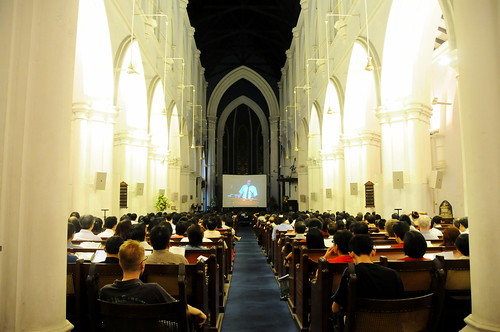


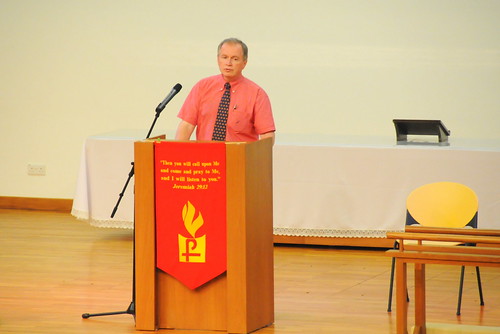
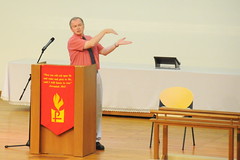
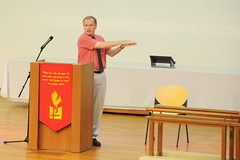
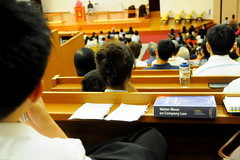







6 Comments:
Hi, thanks for these helpful notes on the talk! hope you don't mind, but i'm going to link to it :-)
Hello,
I've been following your blog with much interest, thank you for articulating your thoughts on Romans with such clarity. I don't understand what you mean by:
'Faith is thought of as a subjective personal choice not abstract objective truth.' Given that faith comes from God, and that only He can reveal this truth to us... how does one *know* what is true in the first place, if there is nothing, not even scholarly pursuit that one can do to assure oneself of this knowledge? Hope that makes sense, typing coherently in a tiny text box is a bit trying. :)
Thanks for those notes! I will read them more in detail this week.
Ken
See my head in the background..lol
Hi Shadow,
Didn't know that "chocolate cake" has become some sort of identification for Carson :-)
Eh, thanks for the link. Initially, I had planned to write my reflections later since then the audio clips would be extremely useful for illustrating the points I would be making, but I guess I would do it up first before the issue gets cold, and then the miscellaneous issues would be addressed in single posts as single topics.
chenhuaizhi: no prob! Just hope that it's a decent representation of the proceedings. Hmmm. The SJSM site seems down at the moment so no chance to check against the mp3 recording yet.
rachel: that's my bad note-taking! Carson started by presenting what the world thought of these concepts (eg. tolerence, faith) then attempted to correct these interpretations. So "faith is thought of as a subjective personal choice not abstract objective truth" is what he said was the world's interpretation of faith - something that differs from individual to individual and not based on any ultimate universal reality.
am not sure if the Don went on to discuss how fallen hearts and minds can know something is true.
my guess is that if corrupt beings are unable to truly understand or interpret correctly what they hear and see (hence the tragedy of Romans 1:18-20), then only those hearts and minds which have been broken into by the Spirit can attest to the truth of God's words (possibly, Romans 12:2).
a bit circular but circularity is only problematic if one adheres to the evidential theory that circularity is, without fail, erroneous. however, imho, such a theory discounts the situation where it is precisely such circularity that is an accurate reflection of reality.
erm, hope i make some sense...
ken: was wondering if that was you! best wait for the mp3 i say, since i'm somewhat challenged in the concentrating-on-anything-for-more-than-10 minutes department.
sze zeng: now it is, it seems! :-)
daniel: cool! will go check out your notes!
Post a Comment
Subscribe to Post Comments [Atom]
<< Home